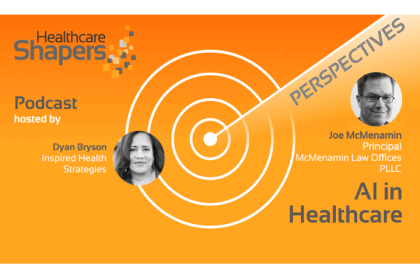
Healthcare Shapers Perspectives Guest:
Joe McMenamin, MD, JD
Principal, McMenamin Law Offices PLLC
Advocates say artificial intelligence will revolutionize healthcare through drug discovery, improved diagnostic accuracy, and more wisely chosen therapies. Critics claim that AI is plagued by algorithm failures, cybersecurity vulnerabilities, and rampant bias, such that it will destroy privacy, fairness, professional job security, and the doctor-patient relationship. Joe McMenamin, MD, JD, discusses both the promises and the threats that AI entails.
Some AI systems are designed so that humans can understand the system’s intent, reasoning, and decision-making processes. Others are designed to generate their own algorithms based on examples and desired output; we humans can view the inputs and outputs of this unexplainable tech, but not its inner workings. The former may seem safer; the latter is often seen as having greater potential for benefit.
Watch as Joe considers both the risks and benefits of these different approaches, and of AI itself, as well as the law’s attempt to cope with the problems and opportunities that AI has given rise to. This video provides a brief introduction to a topic that for better and worse is likely to shape the healthcare of tomorrow in profound and only incompletely predictable ways.
Join us on LinkedIn for a discussion of this episode.
Healthcare Shapers Perspective Podcast
Healthcare Shapers Perspectives Video
Joseph P. (“Joe”) McMenamin, MD, JD is a physician-attorney and the principal at McMenamin Law Offices, PLLC, a healthcare boutique in Richmond, Virginia concentrating on the law of digital health.
Joe advises institutional and individual telehealth service providers, academic medical centers, remote monitoring services, trade associations, telehealth platform companies, investors, and telecoms on a broad array of medico-legal questions arising from distance care and, more recently, from the application of augmented intelligence to health care in general and to telemedicine in particular. He writes and lectures extensively on these and related topics.
He also serves as general counsel to the Virginia Telehealth Network, and as a member of the Legal Resource Team of CTeL, the Center for Telemedicine and eHealth Law. He is board-certified in Legal Medicine, an Associate Professor of Legal Medicine at Virginia Commonwealth University, and a Fellow of the College of Legal Medicine.














